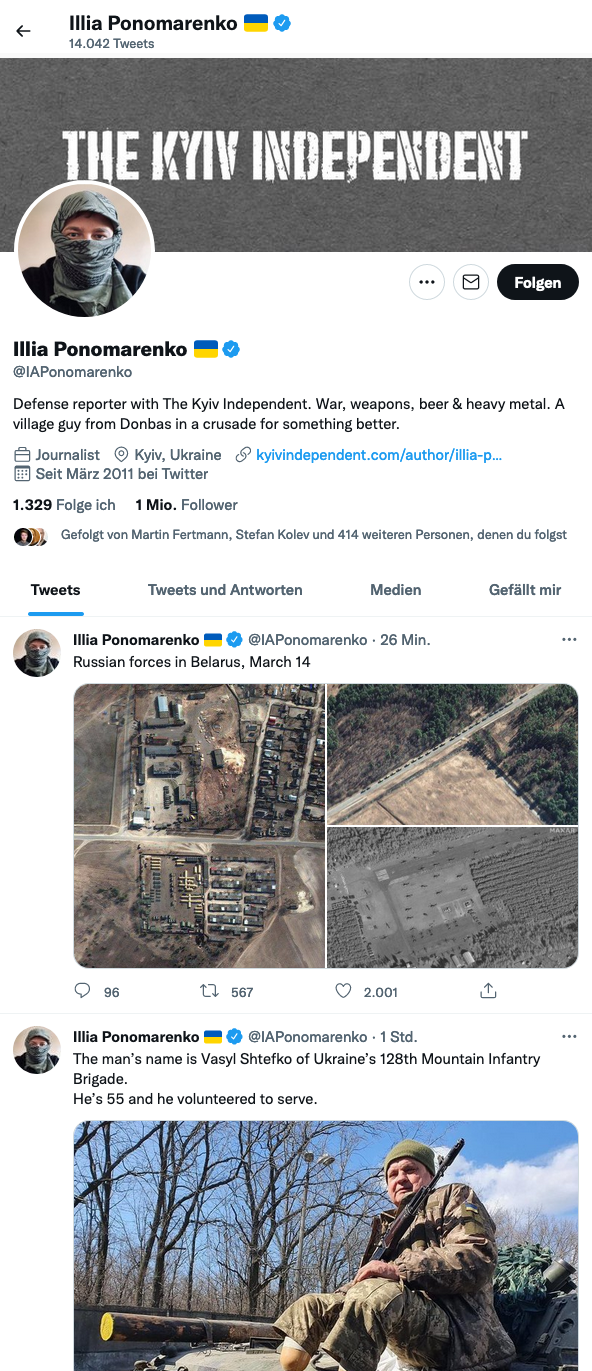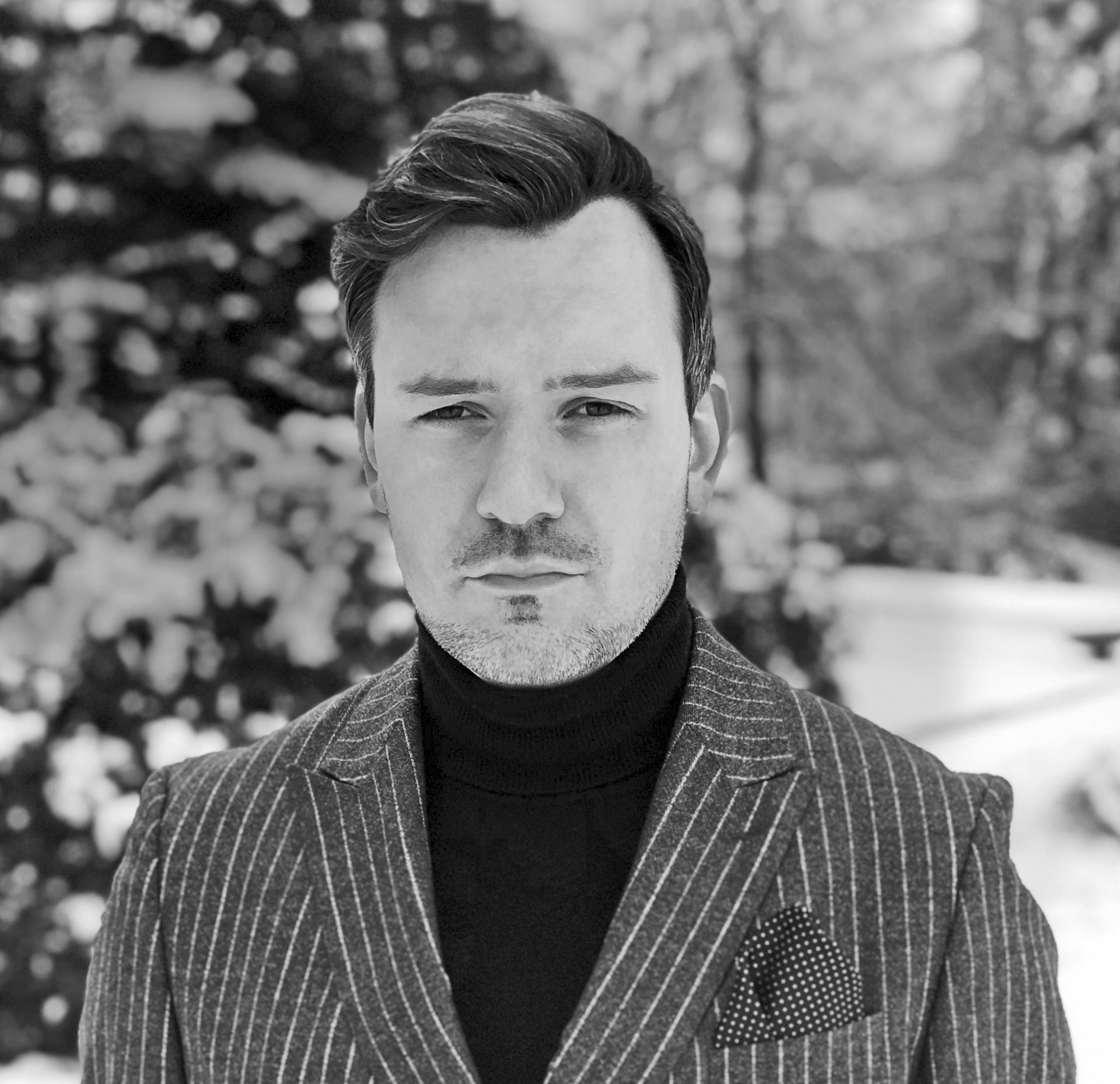WAR IN EUROPE
Urban warfare and heroism via Twitter feed
The armed conflict in Ukraine is also a social media war. The exploits of the local population are broadcast around the world 24/7. The perfect way to counter Putin’s autocratic disinformation.
TEXT: CONSTANTIN ECKNER


WAR IN EUROPE
Urban warfare and heroism via Twitter feed
The armed conflict in Ukraine is also a social media war. The exploits of the local population are broadcast around the world 24/7. The perfect way to counter Putin’s autocratic disinformation.
TEXT: CONSTANTIN ECKNER
Illia Ponomarenko is a star of the Ukraine war. The journalist for “The Kyiv Independent” newspaper, which is internationally celebrated for its tireless reporting, shares the latest developments from the war zone on his Twitter feed almost hourly. Ponomarenko, who comes from a small town in the Donbas region, does not shy away from following the fighting alongside his armed compatriots. And je doesn’t try to be objective, either. He might share pictures of anti-tank weapons or assault rifles and comment, “I can confirm that, on the Ukrainian side, these babies are at practically every corner.” Some of his followers are worried that he is providing important information to the Russians. But Ponomarenko seems to know what he is doing.
From actor to professional president
Another Ukrainian who certainly knows what he is doing is President Volodymyr Zelensky. In the past, actors who entered politics were often ridiculed; politics was theatrical enough with no need for trained professionals, people would say. But the charismatic head of state is now reaping the rewards of his years spent in front of the camera and can sell himself very well. It is safe to assume there is little acting in Zelensky’s work during these days of war, but he does set the scene. At the beginning of the Russian invasion, he put aside his formal suit and has worn plain T-shirts ever since. He has not completely lost his mischievous smile. He is a man of the people who wants to radiate leadership and optimism through the well-known social media channels.
Many people feel great respect for Ukrainian heroism, the regular troops and especially the civilian population.
Pictures to boost morale
Many people feel great respect for Ukrainian heroism; many are impressed by the fighting spirit of the regular troops and especially the civilian population. Such heroism also developed in Bosnia, Libya and Chechnya, but pictures of the heroic deeds did not find their way around the world via Twitter, Instagram and TikTok. In this sense, the Ukraine war is the first “social media war” on the European continent. Ukrainians have understood that they can only win against the disinformation autocrat Vladimir Putin by sharing as much as possible of what is really happening in the cities and regions. This is good for morale at home and important for the call for further support from abroad.
However, in such a social media war, there is a danger that people will quickly become numb. Before the age of 24/7 reporting on various platforms, there were also pictures of battlefields, but they appeared more sporadically and therefore possibly left more of an impression. Today, those who post pictures from Ukraine are hardly likely to think in such a media-strategic way, but simply want to send proof of their own deeds out into the world. When a resident of Kherson, for example, uploads a video on TikTok showing ordinary civilians protesting against Russian soldiers who know no other response but to shoot into the air, she is indeed providing a powerful symbol of the fearlessness of Ukrainians. When pictures are shared on Twitter showing destroyed Russian tanks lining country roads, these are equally powerful symbols of Ukrainian resistance.
The Ukrainians are easily winning the media battle against the more traditional Kremlin. This is evident even on platforms that have so far been dominated by Russia and Putin allies, above all Telegram, which is headed by Russian born CEO Pavel Durov. Telegram’s Querdenker (lateral thinkers) and right-wing groups in the German-speaking world now have to adjust their tonality. Even the Kremlin's most loyal lapdogs can no longer blatantly side with Putin. According to research, however, Telegram continues to be used by Russians loyal to the Kremlin in Ukraine to conduct a form of espionage on the ground.
Telegram continues to be used by Russians loyal to the Kremlin in Ukraine to conduct a form of espionage on the ground.
Propaganda narrative
How will the Ukraine war develop in social media? Moscow has long since shown its hand and, at least in Ukraine and the West, has not been successful with its propaganda. The supposedly necessary denazification of Ukraine was a feeble attempt to justify the war of aggression; in the West, it only evoked bewilderment. At best, the Kremlin can try and keep the flow of information limited in Russia at least, so that its own population does not get to see too many heroic deeds of Ukrainian brothers and sisters. The Ukrainians themselves will continue to send as many images as possible to the world. At the same time, attention in Western and Central Europe will most likely shift towards domestic issues, some of which are only indirectly related to the war a few thousand kilometres away.
As many pictures as possible
This war has shown that social media is not only for the young. In Ukraine, the average person is active with posts and knows how to use the respective platforms. The sense of mission of the people in the civil resistance is enormous. Their use of social media helps to ensure that foreign countries cannot ignore what is happening in Ukraine. It is an important resource that many Ukrainians have no problem with English as a language of communication – unlike the insurgents in the Arab Spring and the subsequent civil wars. As long as the relevant platforms are available in Ukraine, the Russian war of aggression will continue to follow us closely via live feed: a constant thorn in the flesh.

Constantin Eckner is a journalist as well as radio and TV presenter. He works for Deutschlandfunk and the BBC, among others.

Constantin Eckner is a journalist as well as radio and TV presenter. He works for Deutschlandfunk and the BBC, among others.
More articles
Irina Borogan und Andrej Soldatow // Propaganda und Repression
In Russland gerät die Meinungsfreiheit unter die Räder. Das Staatsfernsehen verbreitet Desinformation, unabhängige Medien werden drangsaliert.
Susanne Spahn // Russische Informationswaffen
Die Europäische Union hat die Ausstrahlung russischer Staatsmedien verboten. Die Desinformation durch RT DE ist in Deutschland durchaus erfolgreich – denn der Sender ist weiterhin online.
Oksana Schur // Die Krim heute: Der Eroberer macht mit der Beute, was er will
Es ist ein Zerstörungswerk auf allen Ebenen. Wie die Russen daran arbeiten, die Geschichte und Kultur der Halbinsel umzuschreiben.
